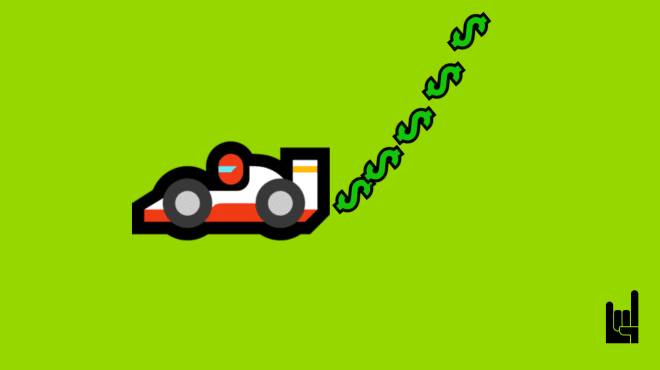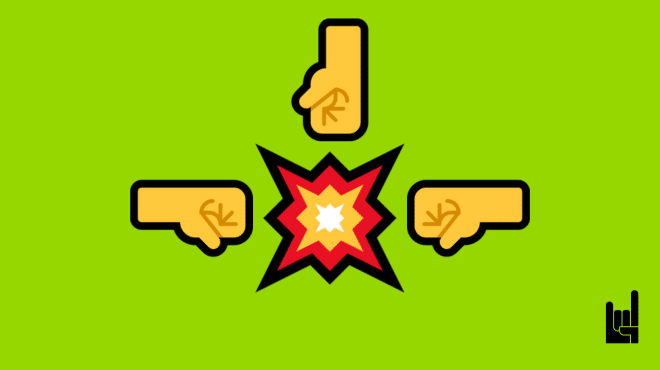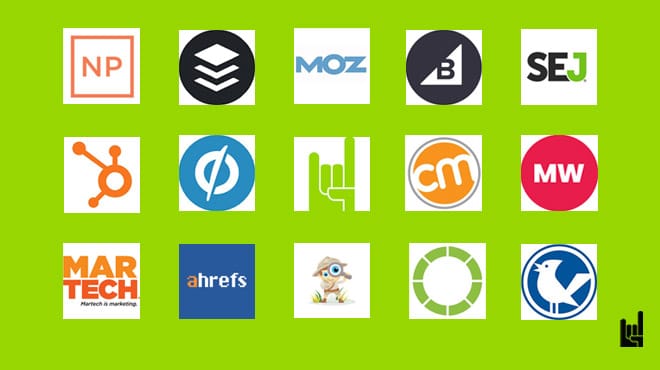And once you acquire some of these skills, how do you actually set foot in the industry? How does one get started with digital marketing?
With no further ado, here’s everything you need to know – starting with the basics.
The State of Digital Marketing in 2023
What is Digital Marketing?
First, let’s get the basics out of the way.
Digital marketing is the activity of promoting or selling products to potential customers through the internet. Digital marketing is also known as internet marketing.
It comes in 9 major types:
- Affiliate Marketing
- Copywriting/ Content Marketing
- Digital advertising
- Email Marketing
- Search Engine Optimization (SEO)
- Social Media Marketing
- Marketing Automation
- Online PR
- Pay Per Click (PPC)
The Current State of Digital Marketing
According to Forbes, digital marketing is in the top 5 in-demand tech skills for jobs in 2023. More companies have turned to digital than ever before, meaning they are in dire need of digital marketing and digital advertising. As a result, digital marketing jobs continue to grow.
What’s more, according to LinkedIn, digital marketing is one of the top hard skills for anyone who is looking to future-proof their career.
In other words, digital marketing is a viable career with a bright present. The question now becomes: does digital marketing also have a bright future? But more on that later.
When do get into digital marketing?
With one word. Now. Now it’s the best time to get into digital marketing.
It’s common sense that when you develop the necessary skills the market needs, the more chances you will have offer your services – and get paid for them. But here’s the kicker: the sooner you develop those high-income skills, the more you can get paid.
Everything is about offer and demand. Indeed, when there are few professionals offering a skill but many customers who are in need of that skill, then they can charge high(er) for their services.
In the case of marketing, this happened for the first time with digital marketing. The first digital marketers could commoditize their services at a higher rate, compared to the marketers who offered these services later in time.
But more waves of changes in digital marketing happened, including growth hacking, PLG marketing, and no-code marketing. And every time professionals could update their skills, they offered those up-to-date services at a better rate.
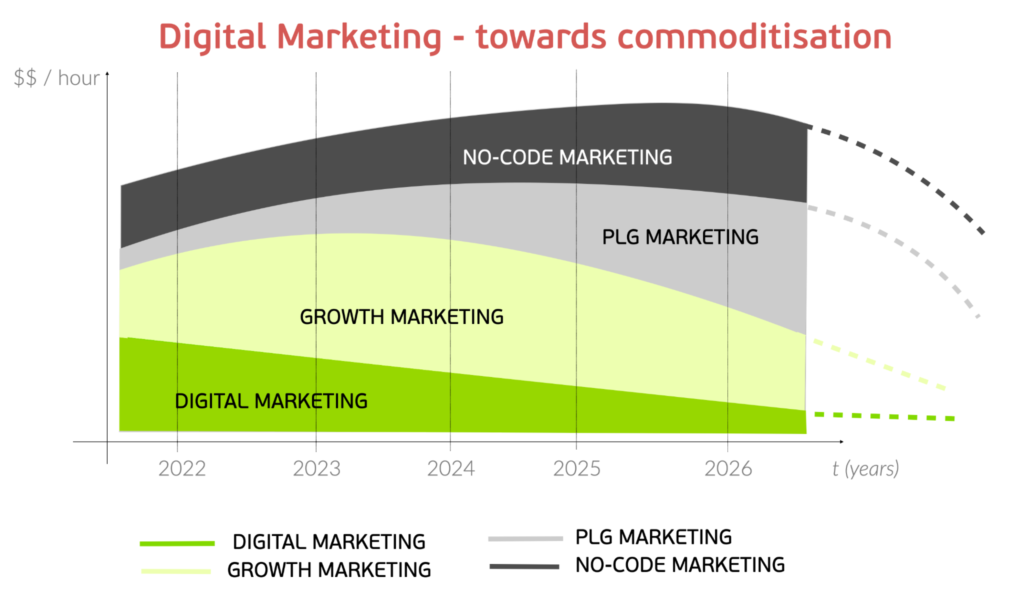
And more changes will most certainly happen. Therefore, for maximum profit, you should ride the wave as soon as possible. As digital marketing is evolving, new marketing tools are coming out, better techniques are being developed and new schools of thought change the way marketers work.
Therefore, you need to keep up with the changes and stay up-to-date to be efficient, or even relevant.
Will AI take my job in digital marketing?
With everything that’s been happening lately regarding AI, you may wonder: will AI vanish all digital marketing jobs? Is there any point in investing in digital marketing skills if in a few years from now, there will be no digital marketing happening by humans?
First, let’s take a step back.
2022 was the prelude to AI and the impact it can have, foreshadowing the many changes that will likely come to many fields and professions, including digital marketing.
First, it was AI-generated art. Although AI-generated art has been around for years, it wasn’t until platforms like Stable Diffusion and DALL-E 2 made it possible to create photorealistic and abstract images simply by accepting input data through a text box.
In other words, you just type in “teddy bears working on new AI research on the moon in the 1980s” and the image that follows is what you can get in a matter of seconds.

And, just at the dawn of 2022, another AI contraption shook the ground of the professional world, namely ChatGPT. ChatGPT is a chatbot launched, created by OpenAI. Among other things, it has the ability to write anything from computer programs to write fairy tales, poetry, and lyrics, even composing music. and student essays.
Or, according to ChatGPT itself: “I am an Assistant, a large language model trained by OpenAI. I am not a person, but rather a virtual assistant designed to assist with answering questions and providing information on a wide range of topics. My main function is to assist users in generating human-like text based on the input I receive.”
Right now, it’s considered the best ai chatbot ever released to the general public.
With all these recent changes in AI, one might wonder: why invest in my digital marketing skills if AI is going to take my job? Well, is it really going to take your job? And my job as well?
It appears that this is not the case for now and for the near future. Although ChatGPT can create content, automate repetitive tasks and do data analysis, it will most certainly transform digital marketing but it will not replace the human factor soon. However, said human will have to learn to work alongside AI.
To conclude, AI is going to bring some serious changes in the digital marketing landscape but it won’t replace us, humans, anytime soon.
How to Get Into Digital Marketing
So, now that you know that digital marketing is a viable career, how does one break into digital marketing?
As with any other job in the world, you are going to need two things: education and experience. Let’s tackle them one by one.
Education
Formal education vs Self-made
In education, there are two different paths you can take.
The first path is formal education. Formal education in digital marketing usually includes joining a University for 3 years to get your Bachelor’s in Digital Marketing. And then 1 or 2 years more for your Master.
With a simple Google search, you will find more than a few universities and colleges, many of which offer online/ remote classes.
The second path is the self-made way; learning yourself through various sources. In contrast with many other professions in the service sector (mechanic, doctor, lawyer, etc), digital marketing is easier to learn. That said, anyone can gain knowledge on medical or mechanical issues but no one is going to visit a doctor who learned how to operate an open heart surgery on their own. Besides, that would be illegal.
But this is not the case for digital marketing. Most marketers in the field haven’t received a formal education. And, interestingly enough, many of them don’t even have a background in marketing, business, or economics; they are engineers, data scientists, and artists.
Now that you know learning digital marketing yourself is doable, here’s what you need to know.
Learning digital marketing on your own
First, you will need to learn the fundamentals.
Google Digital Garage, Google’s education branch, has an online course on the fundamentals of digital marketing. And so do Hubspot and Udemy. The fundamentals are mostly about learning what you can do with digital marketing. You will learn the different marketing channels and strategies, and get introduced to some handy digital marketing tools.

Then, you will have to choose one of the digital marketing types, to begin with. After understanding what each of them is, you can pick one according to your idiosyncrasy – your character. What kind of character are you? If you like numbers, you can start with PPC. On the other hand, if you are more on the creative side, you can focus on copywriting.
After you pick one, you can start searching for more specific courses on the digital marketing branch you’ve chosen. If you want to specialize in email marketing then you will have to dive specifically into the pool of knowledge of email marketing.
Alternatively, if you’ve educated yourself in the basics of digital marketing and you are looking for the next step, consider learning a thing or two about growth hacking. In a few words, growth hacking is the kind of digital marketing that is more data-driven marketing, uses rapid experimentation, and targets the growth of the business.
To get started on growth hacking you can:
– Enroll in a growth hacking course (many of them are free)
– Follow a growth hacking blog
– Follow an established growth hacker on social
Experience
The notorious catch-22 of the business world goes like this:
You can’t get a job without experience.
You can’t get experience without a job.
However, digital marketing is more flexible: you can start getting experience on your own. By working on your own projects and building your own portfolio you will have something to show to the marketing world – a reason to hire you.
Here are a few ideas to get you started on creating your portfolio:
– Create a content calendar for one month for an existing brand of your liking
– Bring live a website on WordPress
– Write an email marketing campaign
– Write social media posts/ social media ads
– Start a blog on a specific niche (for which you’ve found out there is not enough published content)
Building your own portfolio is doable. You can do it in your spare time, at your own pace. And it also requires no serious budget on your part.
That said, not all experience has to come from self-initiated work – helping a friend’s startup or trying to become a VA are both great ways to build your skill set on real tasks.
What doors to start knocking on for your digital marketing career
Upon gaining some knowledge, acquiring some experience yourself, and building your portfolio, it’s a good time to start knocking on some doors. Thankfully, you don’t have to do so literally. You can simply visit a job search engine site and search for relevant digital marketing jobs.
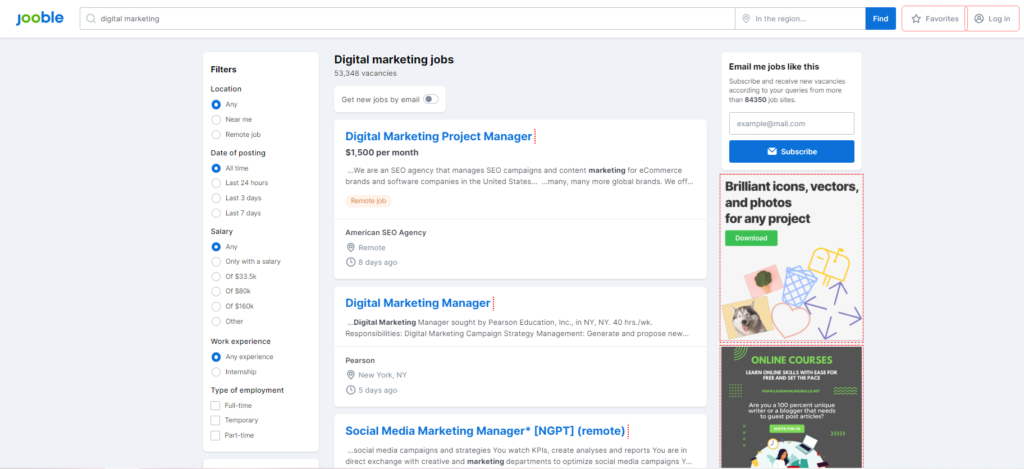
There are three main types of companies to work for in digital marketing: agency, startup, and in-house.
A. Agency
Many companies are not big enough to have their own marketing department. As a matter of fact, most companies in the world don’t. So they outsource their digital marketing activities to respective agencies.
Working in a digital marketing agency means working on different projects for a number of different clients. You will have the opportunity to work for companies across many industries, in a fast-paced environment and learn from a large team of marketing experts.
Keep in mind that besides digital marketing agencies, you can also find more similar agencies. Those agencies include growth hacking agencies, startup marketing agencies, marketing consulting firms, and SaaS marketing agencies.
B. In-house
The larger the company, the biggest the chance that it will have its own marketing department. Doing digital marketing in-house means working for a specific brand.
The good news is that working for a specific brand means that you become familiar enough with the brand that it allows you to get deeper and explore creative roots and angles. Working for a big company also usually comes with greater work stability.
The bad news is that if you don’t like the brand you are working for, then you won’t have the opportunity to work for another brand until you change company.
C. Startup
Working for a startup can be described as working in-house but with the tempo of an agency.
On the one hand, you produce marketing for one brand, the startup. On the other hand, startups are fast-growing entities that are still building their internal processes. Therefore, the average day in a startup is more agile than that of an established company. You will probably have to fill in the shoes of more than one marketing role and change many hats during the day. Which translates into more experience and more freedom for taking initiative.
Of course, there is always the option to start a career in digital marketing as a freelancer. The biggest problem with freelancing is that it’s hard to find your first clients with no previous proven experience. It is doable though if your first clients are members of your family or you start to do the marketing for the company of a friend of yours.
The Top 5 Digital Marketing Skills in Demand in 2023
This is not an era of generalists but rather “multi-specialists”; professionals with deep expertise in multiple aspects of digital marketing. At the same time, digital marketing has made a turn towards a more technical side of things.
So here are the top digital marketing skills you need to start building.
1. Data literacy
Gone are the days when marketing was mostly about theory. Nowadays, digital marketing is all about data. And as time goes by, it becomes more and more data-driven. Working in a data-driven field makes data literacy mandatory.
Data literacy is about developing strong analytical skills and “reading” the numbers. In other words, it’s about learning how to take into account relevant data in order to make the best marketing decision.
Data is not only involved in marketing branches like performance marketing or PPC. From marketing strategy to product development, you need to be able to understand and analyze data the right way. You need to determine and measure KPIs, and understand how marketing influences your growth funnel.
💡 Read: The Top Data Analysis Courses
2. No-code development
Let’s get this straight from the beginning: no one in the business world expects you to know development or know how to write code in your digital marketing role. But no-code development is a valuable -and much-needed- skill.
No code is a type of software development that doesn’t require any code in the process. Traditionally, development was happening only in the form of coding, and coding implied learning a programming language. On the contrary, no-code development happens through graphical user interfaces and configuration, thanks to prebuilt templates and drag-and-drop capabilities.

No-code development happens through no-code platforms. These workflow automation platforms let you create powerful web apps and workflows. Most of them give you the right tools to build an app, a website, a chatbot, or an app for integrations. And all this with the simple power of point-and-clicking and drag-and-dropping.
3. Copywriting
Looking at the titles of the top digital marketing skills in demand for 2023, you probably didn’t expect to find copywriting here. It seems out of place next to data, no-code development, marketing automation, and AI. But hear me out.
Come to think of it, everything we see in the digital space is made up of two elements: words and images. From the homepage of a website a social media ad, to a PPT presentation, they all contain words and images/ other media. Writing is everywhere, and in the case of digital marketing, copywriting is at the center of it.
That said, I’m not implying that every form of writing is related to copywriting. However, many of the rules of copywriting can apply globally to everything you write. So once you get to know the rules of effective copywriting, many of the things you write, from an email to your boss to a brief to your subordinate, will be more concise, clear, and to the point.
4. Marketing automation
Time is money, right? Businesses need the most effective output with the least amount of input. This is where marketing automation comes into play. As the name suggests, marketing automation is about automating certain marketing processes and tasks, such as email flows and social media posting.
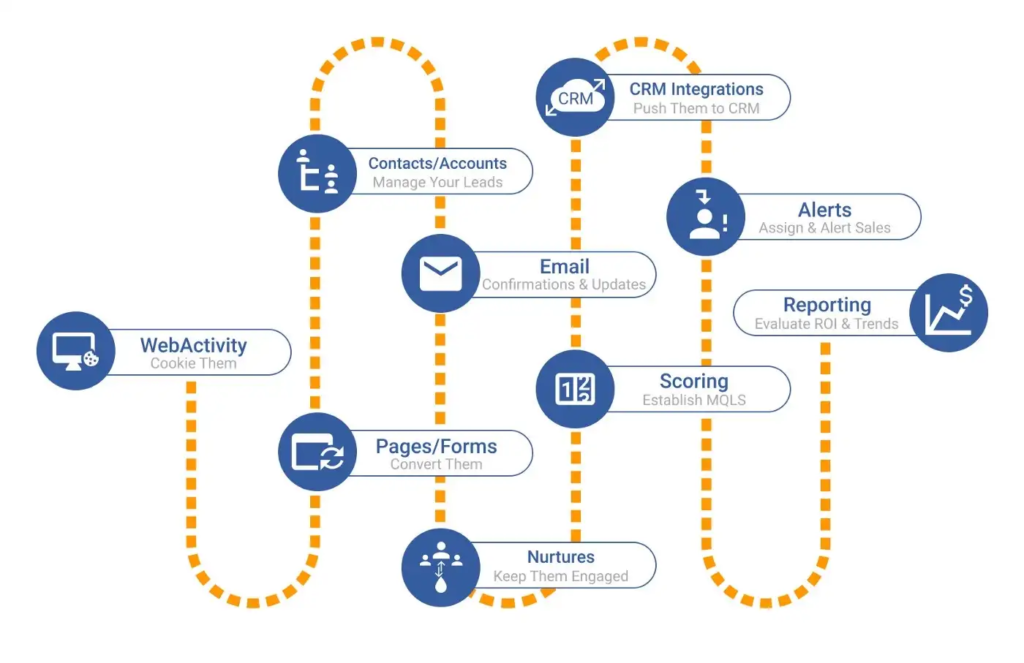
Marketing automation is usually related to email marketing but it applies to many other marketing tasks and instances and is always useful when personalization at scale is needed.
Lastly, marketing automation is also about bridging the information between the platforms and tools you use. Zapier integrations are a good example of that, as they are about automating tasks between web apps.
5. Working alongside AI
A little earlier we agreed that an AI is not going to steal your digital marketing job in the near future. So how will AI affect it? Because one thing is for certain: it will. If we had to use one word to describe how AI will affect digital marketing jobs, that would be “augmentation”. AI is going to enhance the capabilities of digital marketing professionals, both in quantity and quality, complementing their digital marketing skills.
For example, SEO professionals with the help of ChatGPT will be able to compose complex spreadsheet formulas, set up custom pixel conversions, and optimize FAQ and featured snippets. And, in the case of content writers, ChatGPT will assist marketers in content research and content writing.
Digital marketing professionals will need to learn how to work with AI. They will have to explore its potential and find out how AI will help them complete their tasks easier, faster, and with a smaller chance of mistakes.

I write for GrowthRocks, one of the top growth hacking agencies. For some mysterious reason, I write on the internet yet I’m not a vegan, I don’t do yoga and I don’t drink smoothies.
